Running Shopify on QuickBooks Online should be straightforward, but most sellers quickly realize it’s anything but. Each payout bundles sales, refunds, shipping, discounts, fees, and tax into one deposit. QuickBooks records deposits automatically from your bank feed - but those numbers rarely match Shopify’s actual transactions. Reconciling the difference means CSV exports, manual journal entries, and hours lost every month.
QuickBooks does offer a direct Shopify integration, but it often posts incomplete or inaccurate data. Refunds, fees, and sales tax breakdowns are frequently missing, leaving sellers with books that don’t match their bank deposits. Instead of fixing the problem, the native integration adds even more manual cleanup.
That’s why many sellers turn to automation tools. A2X and Link My Books both connect Shopify to QuickBooks Online, creating clean payout summaries that reconcile in minutes. But how they work (and what they cost) are very different.
Key Takeaways from this Post
QuickBooks’ native Shopify Connector often creates more problems than it solves: The app struggles with incomplete data, missing refunds and fees, poor sales tax mapping, and sync errors.
A2X and Link My Books fix these issues with payout summaries that match bank deposits: A2X is reliable for accountants managing multiple platforms, but requires setup for taxes and uses clearing accounts for gateways like PayPal and Stripe.
For growing or multi-channel Shopify sellers, Link My Books is the more scalable option: It’s faster to set up, includes insights and COGS tracking by default, and charges by order volume.







Common Problems With the QuickBooks Connector for Shopify
QuickBooks offers a direct Shopify integration through its Connector app (formerly OneSaas). While it promises to sync orders and payouts automatically, many sellers report limitations that make accurate bookkeeping difficult:
- Order posting: In many setups, the Connector posts each Shopify order individually into QuickBooks. For high-volume sellers this can flood the books with hundreds of small invoices, making reporting harder to manage.
- Incomplete payouts: Refunds, fees, and shipping sometimes require extra configuration (such as “special products” in QuickBooks). If not set up correctly, deposits in QuickBooks won’t match the actual bank deposits, which creates reconciliation issues.
- Sales tax mapping: The Connector has limited flexibility in mapping Shopify’s regional taxes. Sellers operating across multiple states or countries may find rates misapplied or missing, which introduces compliance risks.
- Sync issues: Users have reported occasional sync errors, duplicate entries, or missed transactions, which then need manual cleanup through QuickBooks support or re-imports.
Because of these limitations, many Shopify sellers with QuickBooks Online turn to dedicated tools like A2X or Link My Books, which create clean payout summaries that reconcile directly against bank deposits.

Overview of A2X and Link My Books for Shopify sellers
Both A2X and Link My Books were built to solve the problems that the QuickBooks Connector leaves behind. Instead of pushing every order into QuickBooks, they create summarized payout entries that line up with what actually hits your bank account. This means reconciliation takes minutes instead of hours.
- A2X has been a long-standing tool for Shopify sellers. It creates payout summaries, posts them into QuickBooks as draft invoices or journals, and supports multiple accounting platforms including Xero, Sage, and NetSuite. Its strength lies in accuracy and flexibility, but it requires more setup and costs more as you expand to multiple channels.
- Link My Books is newer but designed specifically for e-commerce sellers using QuickBooks or Xero. It automates VAT and OSS for UK/EU sellers, includes SKU-level COGS tracking, and even offers benchmarking and P&L insights by sales channel. Its pricing model is flexible, based on order volume and number of channels, making it attractive for multi-channel sellers scaling up from Shopify to Amazon, Etsy, eBay, and TikTok Shop.
💡 In short: Both tools automate Shopify-to-QuickBooks bookkeeping, but Link My Books is faster to set up and more affordable for multi-channel sellers, while A2X offers broader compatibility with accounting systems beyond QuickBooks.
TL;DR: A2X vs Link My Books for Shopify + QuickBooks
💡 Both tools fix the issues with QuickBooks Connector by posting accurate payout summaries. A2X is strong for accountants managing across multiple platforms, while Link My Books wins on VAT handling, insights, and cost efficiency for Shopify sellers scaling across channels.
What most Shopify sellers don’t consider with the A2X & QuickBooks integration
At first glance, A2X seems like a straightforward way to move Shopify data into QuickBooks. But once you start using it, there are details that can surprise sellers — especially when scaling up.
- Clearing accounts add complexity: A2X posts Shopify Payments as clean payout summaries that match deposits, but for PayPal, Stripe, and other gateways it routes entries through clearing accounts. This means you’ll still need to reconcile those balances manually when bank deposits arrive.
- Sales tax setup isn’t automatic: A2X includes sales tax, VAT, and GST lines in its summaries, but you’re responsible for mapping them correctly in QuickBooks. Sellers working across multiple states or VAT regions often need their accountant to step in.
- COGS journals require prep: A2X can track Cost of Goods Sold, but only if your SKUs and costs are set up consistently. Without accurate product data, COGS reports will be incomplete or misleading.
- Free trial is limited: A2X’s free trial covers just the last 3 payouts. If you want to backdate Shopify sales in QuickBooks, you’ll need a paid plan to unlock historical data.
- Per-channel pricing stacks up fast: A2X charges separately for each sales channel (Shopify, Amazon, eBay, etc.). Once you expand beyond Shopify, costs climb sharply compared to Link My Books’ flexible pricing model.
💡 Bottom line: A2X works well for Shopify-only sellers who want accurate summaries in QuickBooks. But if you use multiple payment gateways or plan to expand into more sales channels, expect extra setup work and higher costs.
A2X vs Link My Books: Features Compared
Both A2X and Link My Books aim to solve the same problem: getting accurate Shopify data into QuickBooks without hours of manual work. But while they overlap in some areas, the way each tool handles tax automation, reconciliation, reporting, and support can make a big difference for sellers once the business scales. Here’s how they compare feature by feature.
Tax automation
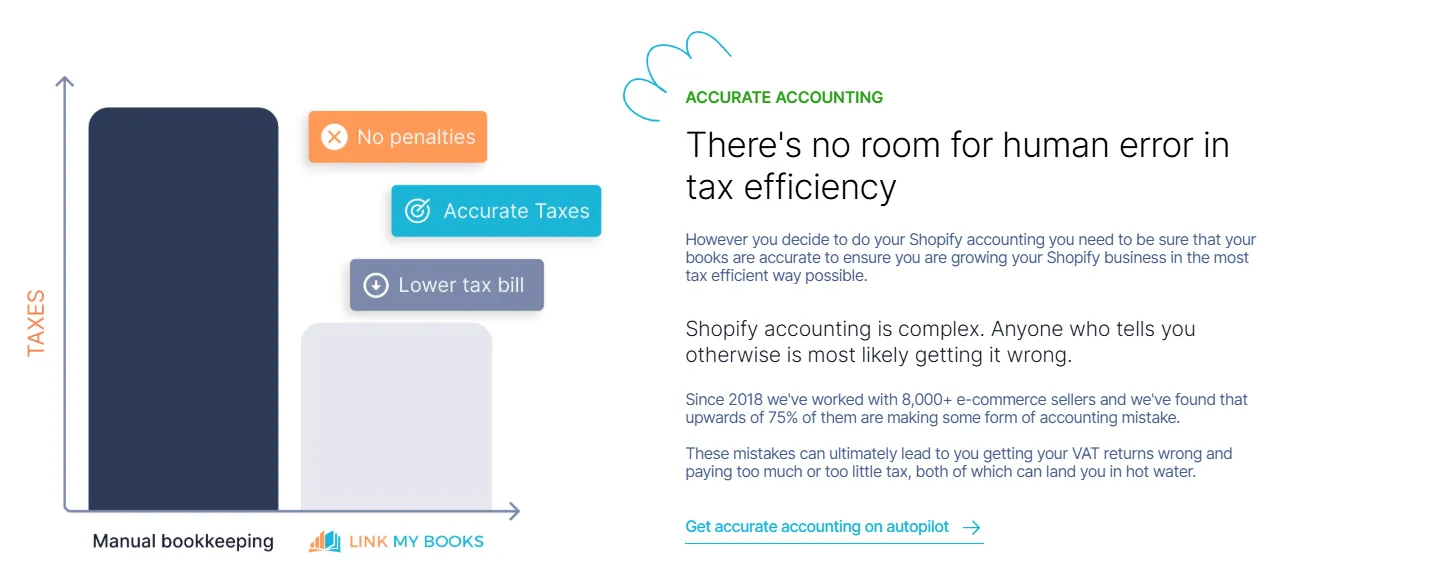
- A2X: Includes sales tax, VAT, and GST in payout summaries, but requires users to map those codes in QuickBooks. For U.S. sellers this means configuring state-by-state rules; for EU/UK sellers it often requires an accountant to apply VAT and OSS correctly.
- Link My Books: Automates tax handling out of the box. It applies VAT, OSS, and zero-rated logic automatically for EU/UK sellers, and separates taxable vs. non-taxable sales for U.S. sellers.
Winner: Link My Books - automation removes the risk of misapplied tax codes.
Reconciliation
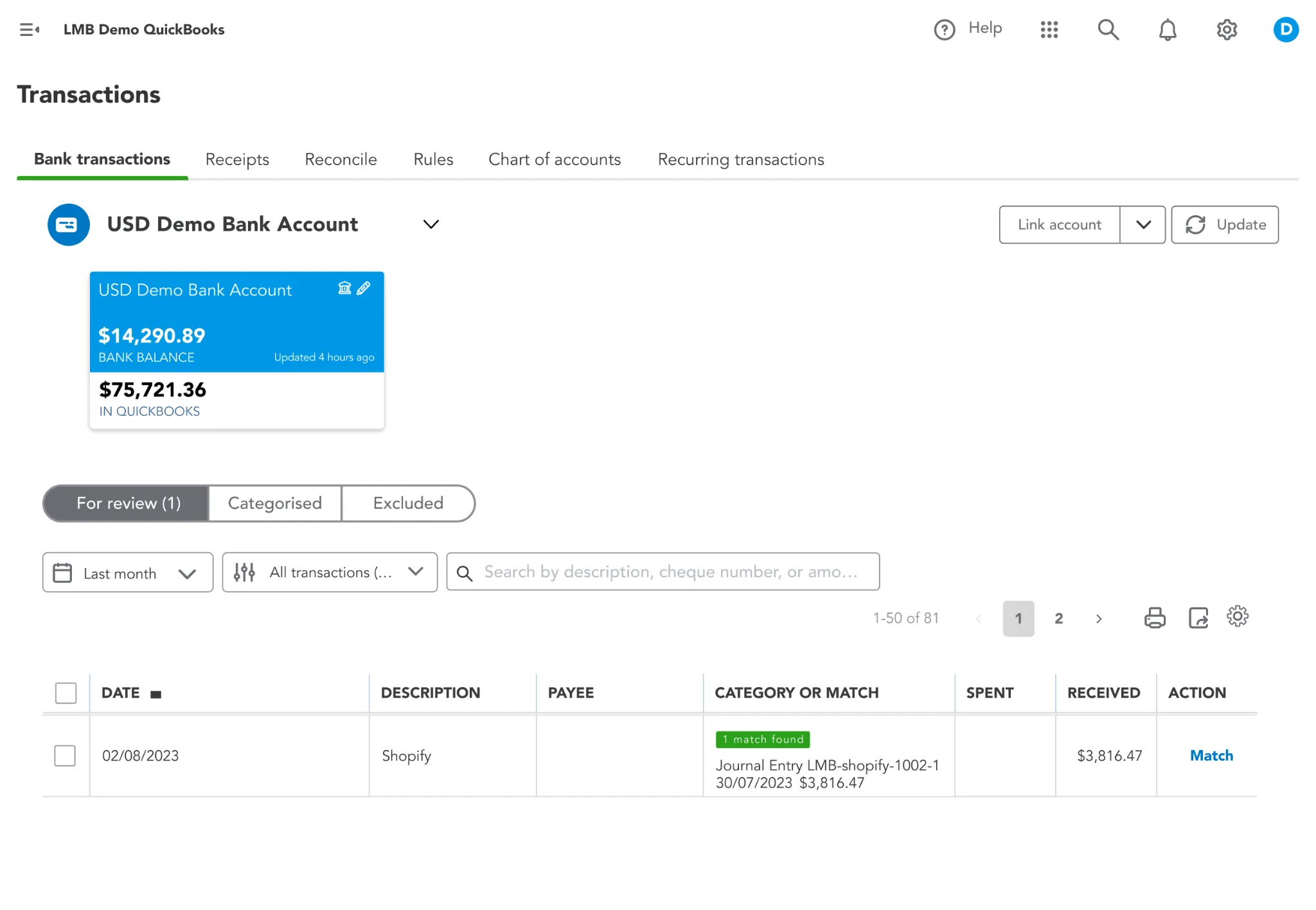
- A2X: Creates payout summaries for Shopify Payments that match deposits, but other gateways (like PayPal or Stripe) are routed through clearing accounts. Sellers then need to manually reconcile those balances once deposits arrive.
- Link My Books: Builds invoices that match QuickBooks bank feed deposits across all gateways. Whether payouts come from Shopify Payments, PayPal, or Klarna, they tie out in one click.
Winner: Link My Books - cleaner reconciliation without clearing accounts.
COGS tracking

- A2X: Offers monthly COGS journals at SKU level, but relies on accurate product cost data in Shopify. Missing or inconsistent SKUs will lead to gaps in gross profit reporting.
- Link My Books: Includes SKU-level COGS tracking by default. Costs sync automatically with sales, giving QuickBooks accurate gross profit reports without extra configuration.
Winner: Link My Books - easier COGS tracking included on all plans.
Reporting & insights
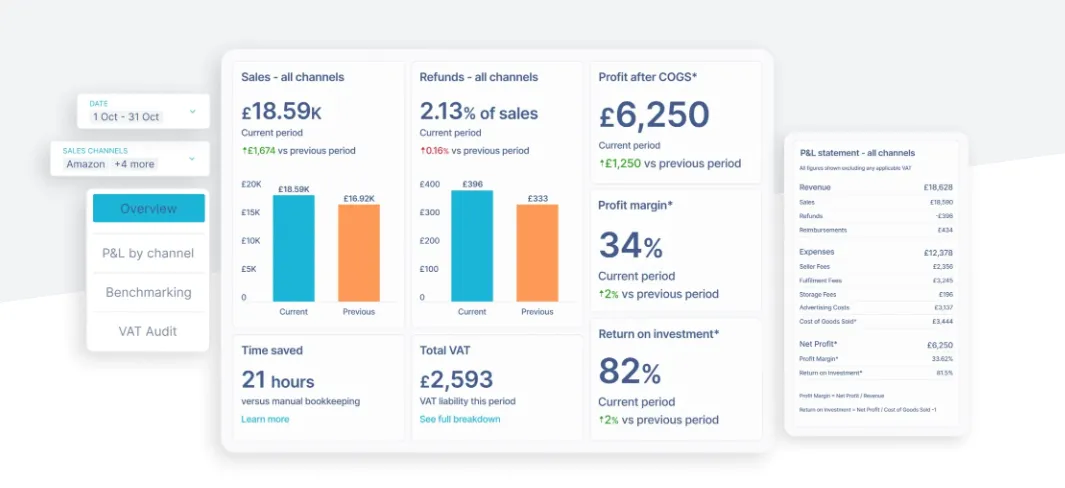
- A2X: Focuses purely on syncing data into QuickBooks. There are no built-in dashboards, profitability analysis, or benchmarking tools. Sellers must build those reports themselves in QuickBooks or a third-party app.
- Link My Books: Goes beyond reconciliation by providing profitability by sales channel, refund rates, fee breakdowns, and industry benchmarking. Sellers can see which channels are most profitable without leaving QuickBooks.
Winner: Link My Books - turns QuickBooks into a decision-making dashboard.
Integrations
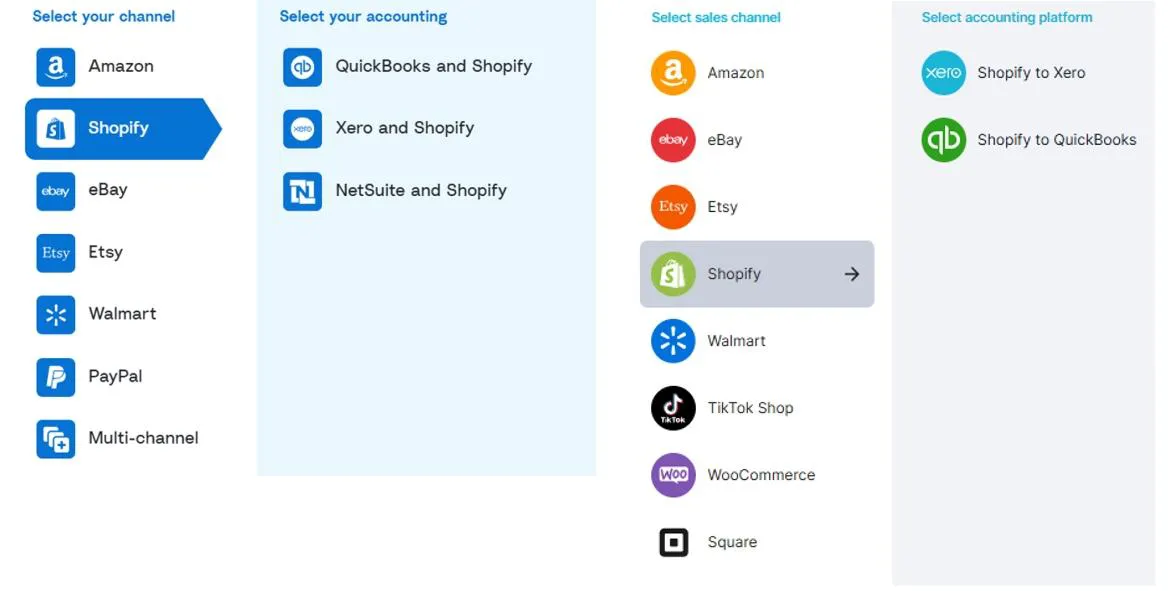
- A2X: Works with Shopify, Amazon, eBay, Etsy, Walmart, and BigCommerce. On the accounting side, it integrates with QuickBooks, Xero, Sage, and NetSuite, making it useful for larger firms with varied clients.
- Link My Books: Works with Shopify, Amazon, eBay, Etsy, TikTok Shop, Walmart, Square, and WooCommerce. It integrates directly with QuickBooks Online and Xero.
Winner: Tie - A2X offers broader accounting software coverage, while Link My Books supports more e-commerce channels.
Support

- A2X: Provides 24/7 chat and email support. Accountants and bookkeepers on higher-tier plans can access VIP onboarding calls and extra resources.
- Link My Books: Every plan includes a free onboarding call with a UK-based accountant, email support from e-commerce accounting specialists, and access to training resources and webinars.
Winner: Link My Books - deeper, accountant-led support available to all users.
Link My Books overview
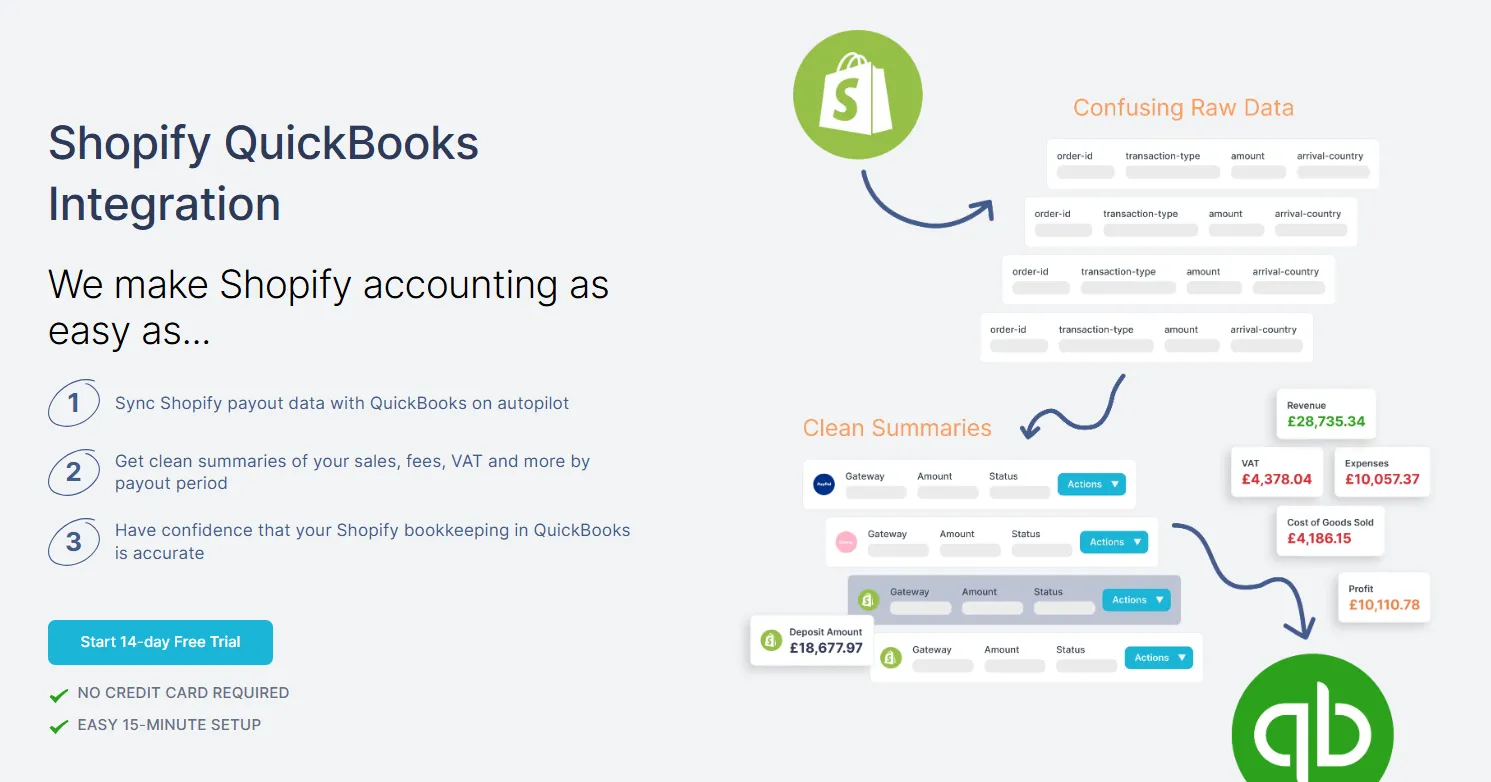
Link My Books was built specifically for e-commerce sellers using Shopify with QuickBooks Online or Xero. Instead of cluttering your books with every order, it creates summarized payout invoices that match your bank deposits line for line.
Beyond reconciliation, it automates VAT and sales tax handling, syncs SKU-level COGS, and even provides profitability insights by channel - features designed to give Shopify sellers financial clarity without manual spreadsheets.
Here’s what to expect:
Automated categorization
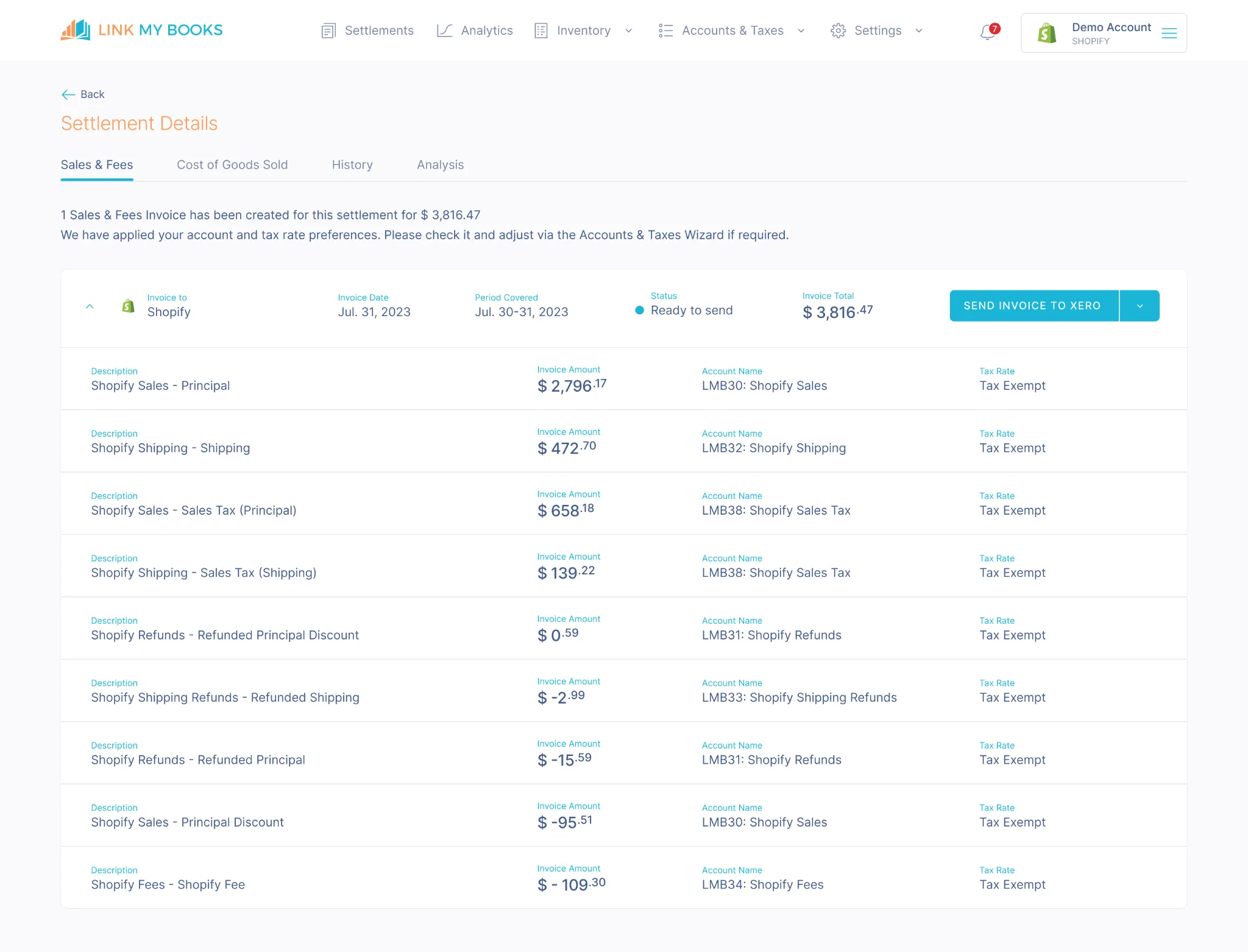
No more guessing where fees or refunds should go in QuickBooks. Link My Books breaks down each Shopify payout into sales, shipping, fees, refunds, discounts, and taxes - then maps them to the correct accounts in QuickBooks. Once set up, it runs automatically and consistently.
Daily or per-payout summary invoices
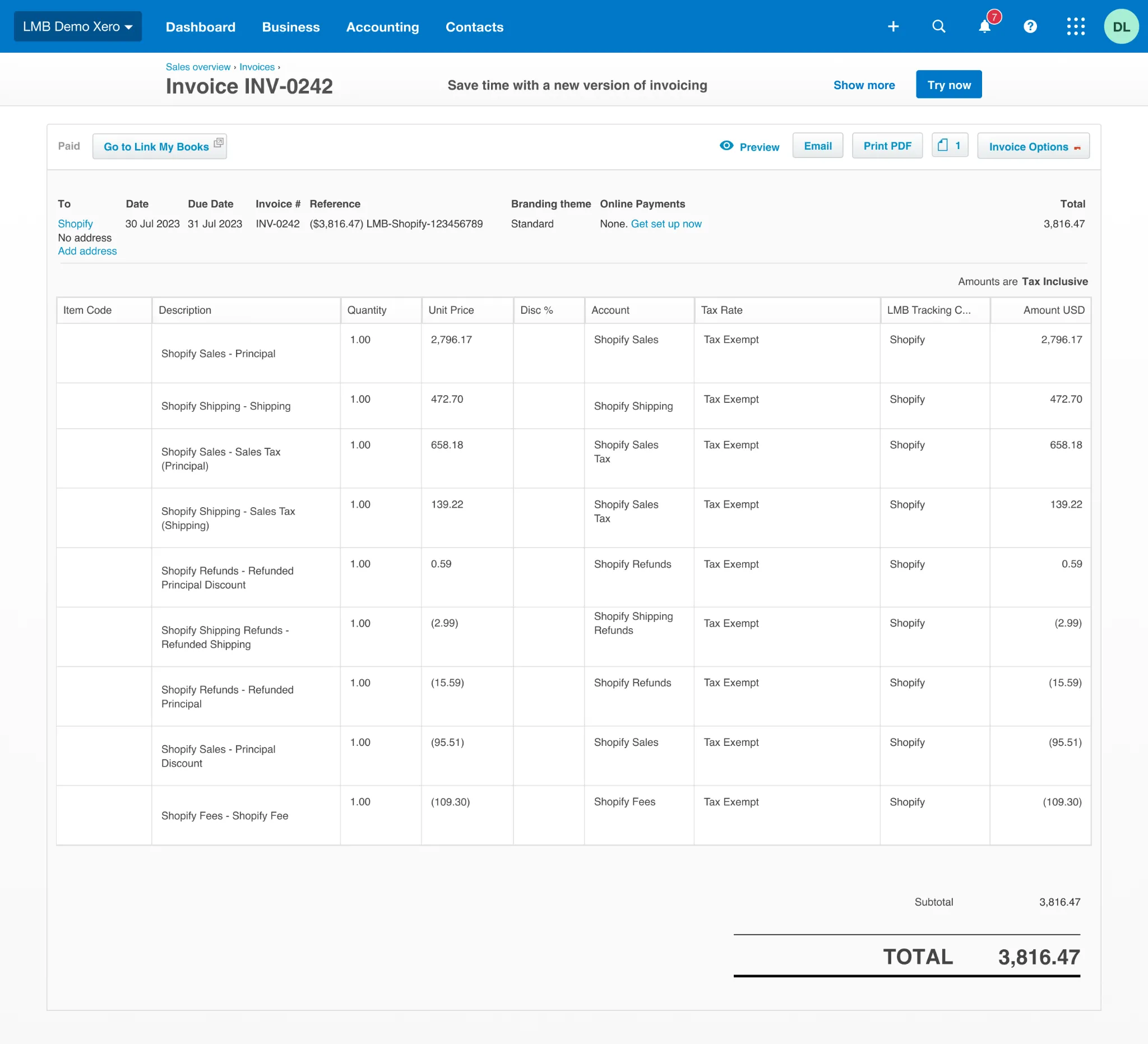
Choose the sync mode that fits your workflow: post each Shopify payout as it arrives, or opt for a daily summary. Either way, you’ll get clean, consolidated invoices in QuickBooks that are easy to review and reconcile.
Entries that reconcile with one click

Each summary invoice matches your bank deposit exactly. In QuickBooks, you simply open the reconcile screen, and the payout matches instantly. No more wondering why QuickBooks shows one number while your bank account shows another.
Built-in tax automation

For EU/UK sellers, Link My Books applies VAT and OSS rules automatically, separating zero-rated and standard-rated sales correctly. U.S. sellers benefit from proper separation of taxable and non-taxable sales, reducing errors when QuickBooks calculates tax.
Multi-channel support
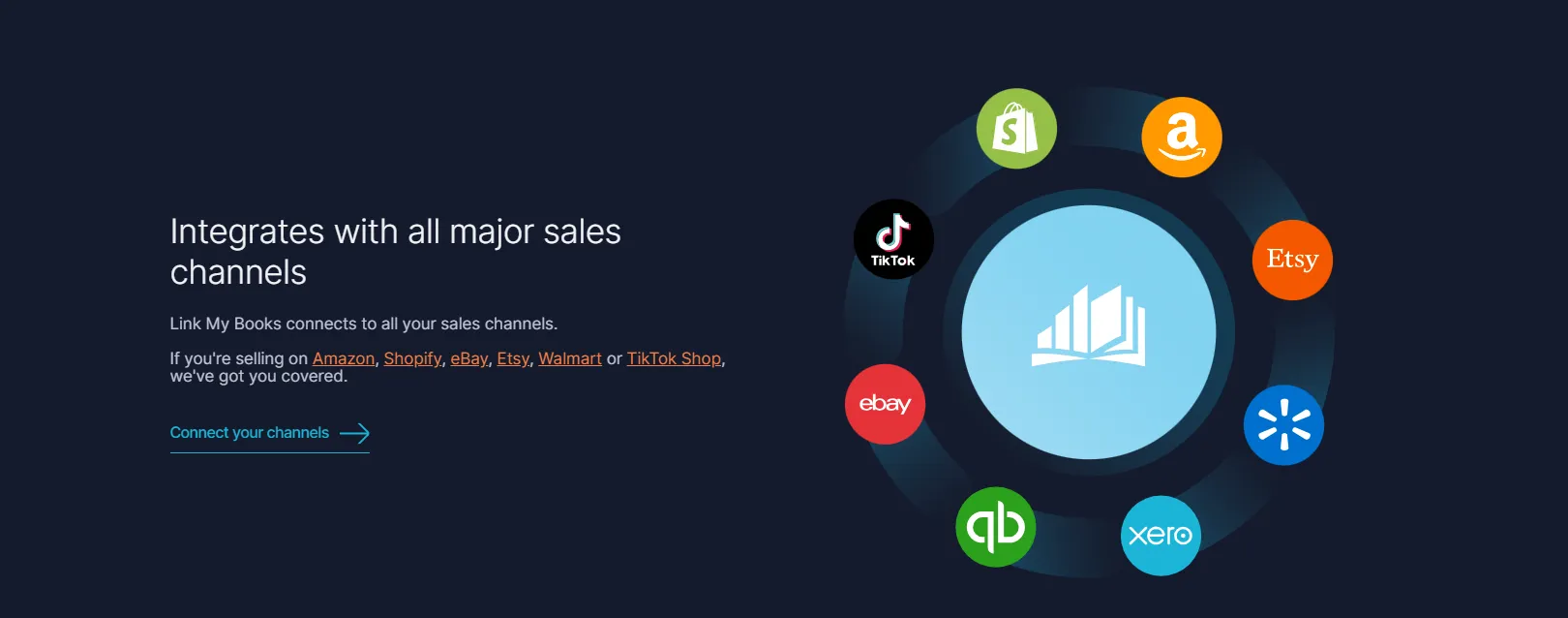
In addition to Shopify, Link My Books integrates with Amazon, eBay, Etsy, TikTok Shop, Walmart, Square, and WooCommerce. It gives you channel-level Profit & Loss, so you can compare performance across platforms without extra spreadsheets.
Financial insights and benchmarking

Beyond reconciliation, Link My Books provides refund rates, fee breakdowns, and benchmarking against other e-commerce sellers. This turns QuickBooks from a record-keeping tool into a decision-making dashboard.
Works with every major payment gateway
Shopify Payments, PayPal, Klarna, Clearpay, Amazon Pay - Link My Books recognizes them all, syncs them independently, and produces summaries that tie back to QuickBooks. You can reconcile weekly or monthly with confidence.
Positives of Link My Books
- Built by accountants for e-commerce: Designed specifically for Shopify + QuickBooks sellers dealing with VAT, sales tax, and reconciliation headaches.
- Dynamic pricing model: Costs scale with your order volume and number of channels - no separate subscriptions for each platform.
- Unlimited users: One account covers your team and your accountant without extra fees.
- Free onboarding for every customer: Each new user can book a call with an e-commerce accountant to ensure correct setup.
Downsides of Link My Books
- Initial learning curve: Sellers new to QuickBooks may still want their accountant to review setup, especially for VAT or sales tax.
- Historical data depends on plan: Starter plans include 3 months of historical imports, while higher tiers expand to 12 or 24 months. More history is available as a paid add-on.
Link My Books pricing
Link My Books uses a flexible pricing model that scales with your business instead of locking you into rigid tiers. Pricing is calculated based on two factors:
- Monthly order volume: whether you process 200 or 200,000 orders, you only pay for the volume you handle.
- Number of sales channels: connect Shopify alone or add Amazon, Etsy, eBay, TikTok Shop, Walmart, Square, and WooCommerce under one subscription.
Use our pricing calculator to determine where you land.
[cms-pricing-tool]
Example pricing snapshots:
- Small seller (200 orders, 1 channel): Around £17/month (~US$21). Includes all features, 3 months of historical data, and unlimited users.
- Growing seller (5,000 orders, 2–3 channels): Around £75/month (~US$95). Historical data expands to 18 months, making it easy to catch up on previous reporting periods.
- Established seller (10,000 orders, 5+ channels): Around £115/month (~US$145). Includes 24 months of historical data and covers multiple high-volume channels.
- Enterprise seller (50,000+ orders): Pricing scales smoothly — no sudden jumps into “custom enterprise pricing.” You simply pay more as your volume grows.
What’s always included, regardless of plan:
- Automated VAT and OSS handling for UK/EU sellers
- U.S. sales tax separation for taxable vs non-taxable sales
- SKU-level COGS tracking for accurate gross profit in QuickBooks
- Unlimited users, so accountants and team members can all log in
- Industry benchmarking and profitability insights by channel
- Free onboarding call with an e-commerce accountant
- A 14-day free trial with no credit card required
💡 Unlike A2X, Link My Books doesn’t charge separately for each sales channel. That means a Shopify seller who adds Amazon or TikTok Shop won’t be forced into a higher multi-channel tier - you simply keep paying for the order volume you process. For multi-channel Shopify businesses, this pricing structure can save hundreds or even thousands of pounds per year.
A2X overview
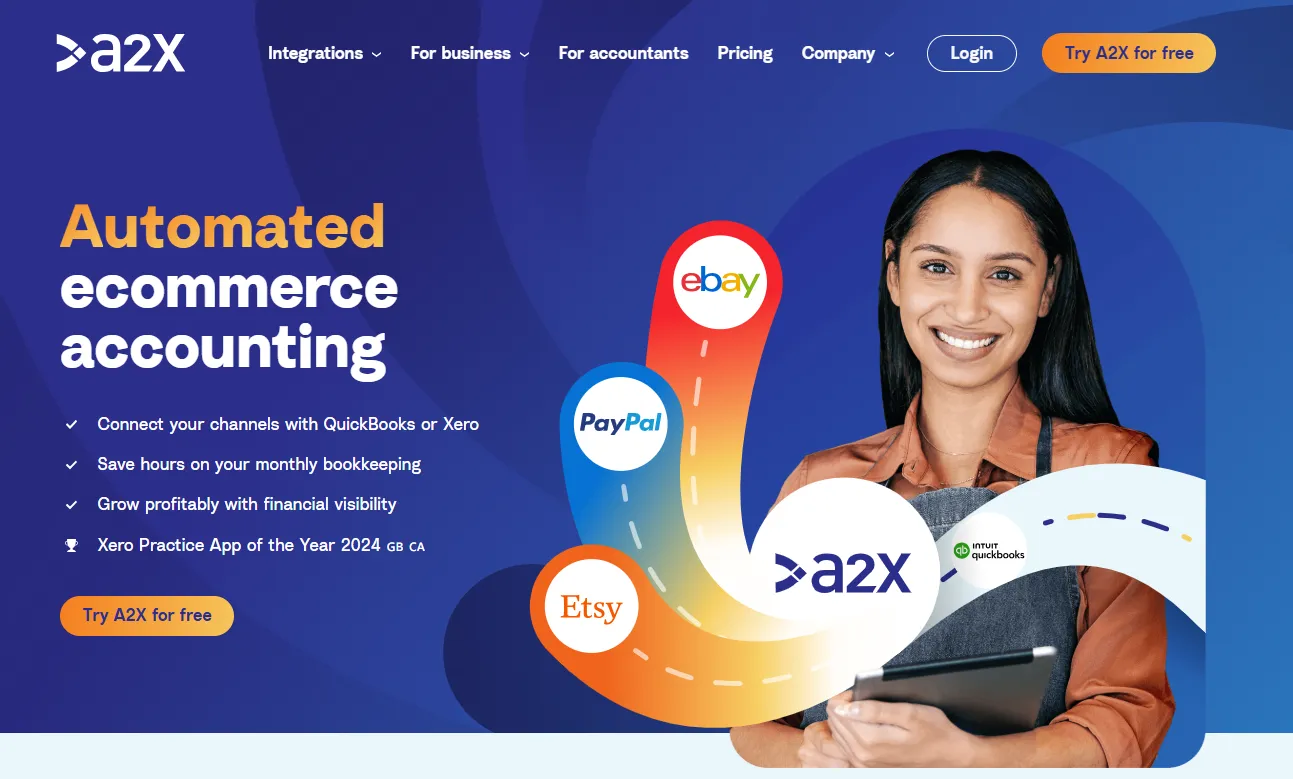
A2X is one of the most established tools for automating Shopify bookkeeping into QuickBooks Online. It specializes in creating payout summaries that capture sales, refunds, shipping, fees, and taxes, and then posts them into QuickBooks as draft invoices or journals.
This approach ensures cleaner reconciliations than the QuickBooks Connector app, but it comes with added complexity for non-Shopify payment gateways and higher costs for multi-channel sellers.
Summarized payout entries
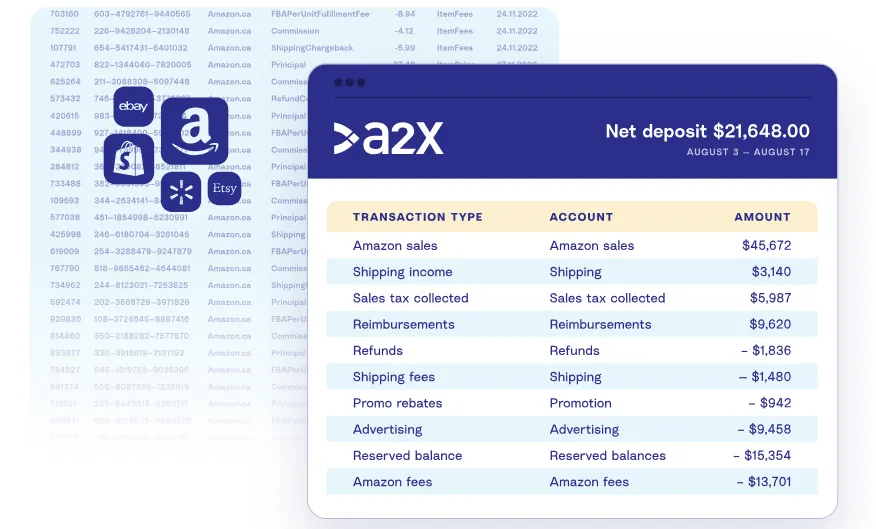
A2X creates a summary in QuickBooks every time Shopify issues a payout. These entries include sales, refunds, fees, shipping, and taxes, and are posted as draft invoices or journals ready for approval and reconciliation.
Handling other gateways
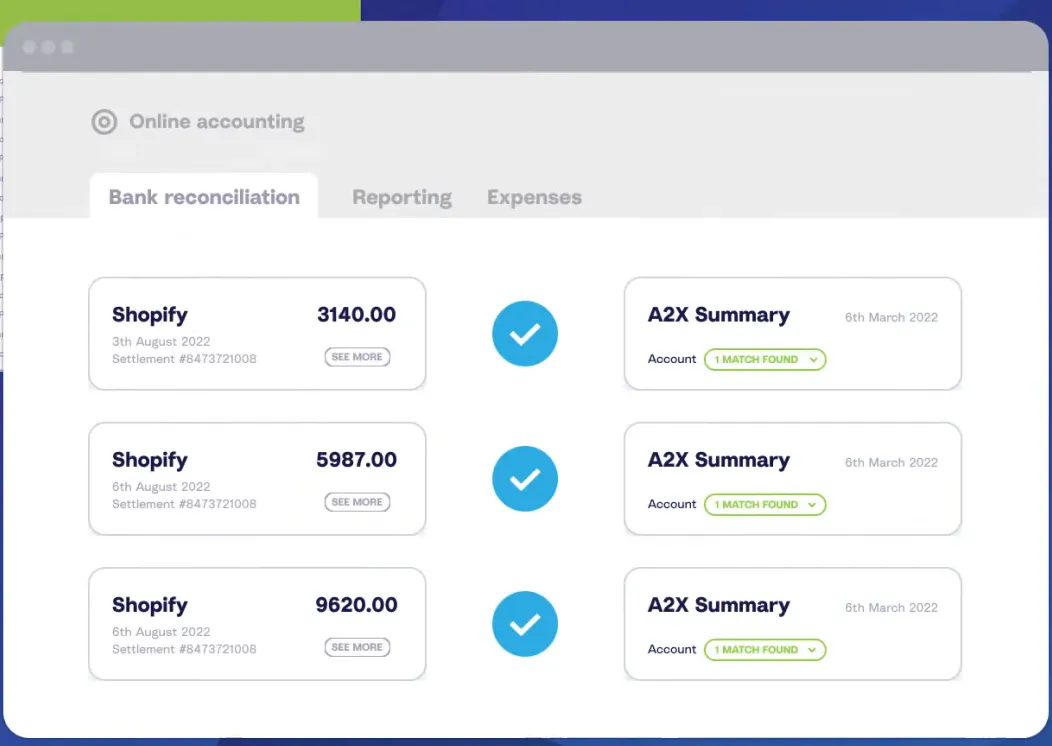
For Shopify Payments, payouts in QuickBooks match deposits directly. For other gateways like PayPal or Stripe, A2X posts transactions into clearing accounts, which then need to be reconciled manually when deposits arrive.
Tax mapping
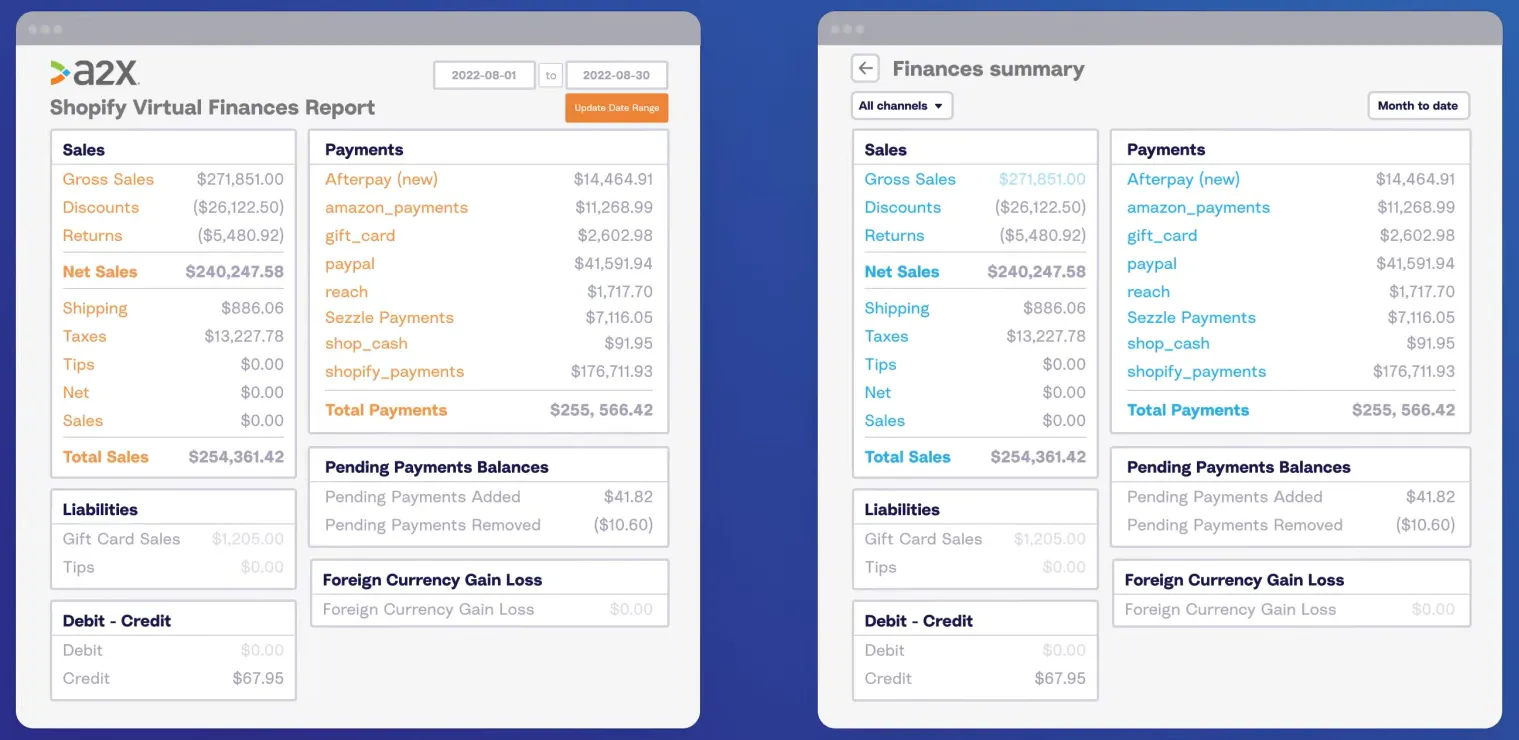
A2X supports sales tax, VAT, and GST. It identifies Marketplace Facilitator Taxes (MFV), but users must map tax codes manually in QuickBooks to ensure correct treatment across states or countries.
COGS tracking
A2X can calculate Cost of Goods Sold at the SKU level if product data and costs are properly maintained. It posts COGS journals monthly, giving a clearer picture of gross profit margins.
Positives of A2X
- Accurate payout summaries: Aligns Shopify payouts with QuickBooks entries, reducing reconciliation errors.
- Multi-jurisdiction tax support: Works with VAT, GST, and U.S. sales tax, making it flexible for international sellers.
- Accounting software compatibility: Beyond QuickBooks, it also integrates with Xero, Sage, and NetSuite - useful for accountants managing clients on different systems.
Downsides of A2X
- Extra steps for PayPal/Stripe: Clearing accounts add complexity compared to tools that match all gateways directly.
- Manual tax mapping: Sellers must set up and maintain tax codes in QuickBooks, which often requires accountant input.
- No built-in insights: A2X focuses only on syncing data. There are no dashboards, profitability breakdowns, or benchmarking features.
- Per-channel pricing: A2X charges separately for each sales channel. Multi-channel sellers must upgrade to higher tiers or run multiple subscriptions, which can become expensive.
A2X pricing
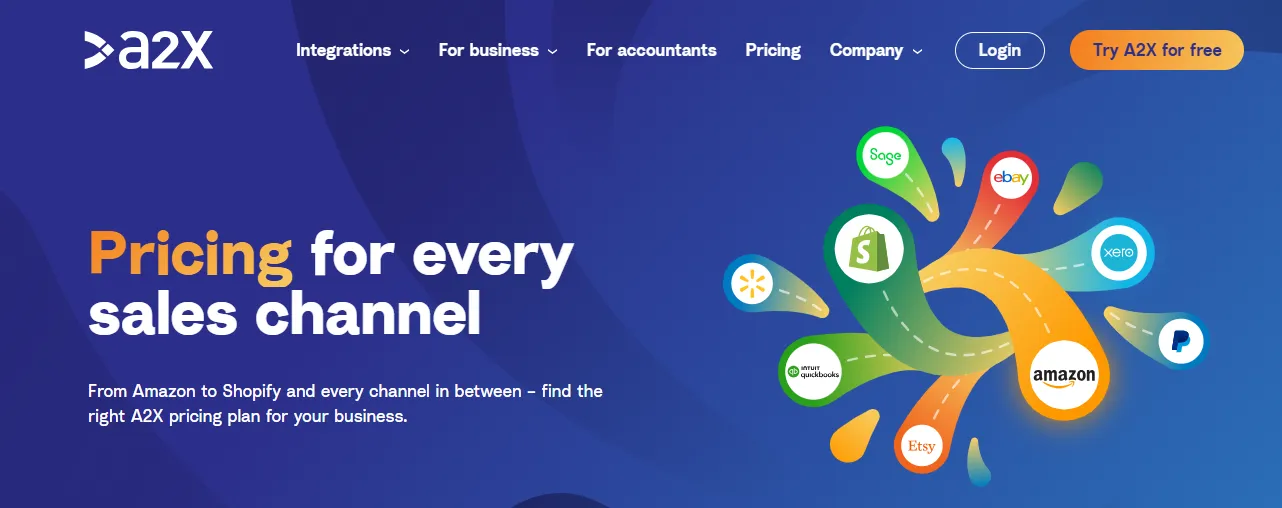
- Mini plan: US$29/month, up to 200 orders. Includes 3 months of historical data.
- Basic plan: US$45/month, up to 500 orders. Includes 6 months of historical data.
- Professional plan: US$79/month, up to 2,000 orders. Includes 12 months of historical data.
- Premium 5K plan: US$115/month, up to 5,000 orders. Includes unlimited historical data.
- Premium 10K plan: US$159/month, up to 10,000 orders. Includes unlimited historical data.
- Higher tiers (15K, 20K, 30K+) scale from US$229/month to US$579/month.
Multi-channel pricing: If you sell on Shopify plus other platforms like Amazon or eBay, you’ll need a multi-channel plan. These are more expensive and cap the number of channels (usually up to 5).
Free trial: Lets you view the last 5–10 payouts and post up to 3 entries into QuickBooks before requiring a subscription.
💡 A2X offers accurate payout summaries, but pricing climbs quickly as order volume or sales channels increase. Read our full breakdown of A2X pricing for a deeper dive.
Link My Books vs A2X Pricing (2025)
💡 Summary: A2X works well for single-channel Shopify sellers, but costs escalate quickly with order growth or extra channels. Link My Books’ order-based pricing is consistently cheaper for multi-channel businesses and includes unlimited users, tax automation, and COGS tracking at every level.
A2X or Link My Books: Which should you choose?
Both A2X and Link My Books clean up the mess that the QuickBooks Connector leaves behind by creating summarized payout entries that reconcile against your bank deposits. But when it comes to tax handling, reconciliation flow, financial insights, and cost structure, there are clear differences.
Recommendation
- Choose A2X if: You’re an accountant managing multiple platforms (including Sage or NetSuite) or you need extremely granular payout summaries for Shopify-only bookkeeping.
- Choose Link My Books if: You want Shopify + QuickBooks integration that sets up quickly, applies VAT and sales tax automatically, and stays affordable as you expand across channels.
💡 With its dynamic order-based pricing, Link My Books is consistently cheaper and more flexible than A2X. For most Shopify + QuickBooks sellers, Link My Books is the better fit: one-click reconciliation, automated tax handling, and insights that go beyond data syncing.
Frequently Asked Questions
How does A2X connect Shopify to QuickBooks?
A2X summarizes each Shopify payout into invoices or journals that include sales, refunds, fees, shipping, and taxes. These are posted as drafts in QuickBooks for approval and reconciliation. For a simpler approach, see our guide on Shopify QuickBooks integration.
Does A2X handle PayPal and Stripe payments from Shopify?
Yes, but with extra steps. Shopify Payments payouts reconcile directly, while PayPal and Stripe are routed into clearing accounts. Sellers must then reconcile those balances manually. Link My Books handles this automatically as part of Shopify bookkeeping.
Can A2X track Cost of Goods Sold (COGS) for Shopify in QuickBooks?
Yes. A2X can generate monthly COGS journals if SKUs and product costs are maintained accurately. Without consistent data, reports will be incomplete. Link My Books includes automatic SKU-level COGS tracking in all plans, making it a smarter choice for Shopify accounting software.
Does Link My Books handle VAT and sales tax in QuickBooks?
Yes. Link My Books applies the correct VAT, OSS, and U.S. sales tax rules automatically, separating zero-rated, reduced-rate, and standard-rated sales. This reduces compliance risk and saves hours of manual work. Learn more in our Shopify VAT guide.
What’s the difference in pricing between A2X and Link My Books?
- Link My Books starts around £17/month (~US$21) for 200 orders, scaling with order volume and number of sales channels.
- A2X starts at US$29/month for 200 orders, with higher tiers reaching US$159/month for 10,000 orders and US$229–579/month for larger or multi-channel plans.
See our full breakdown of A2X alternatives for details.
Which tool is better for multi-channel sellers?
Link My Books. Its pricing allows you to connect Shopify, Amazon, Etsy, eBay, TikTok Shop, and more under one subscription. A2X requires separate plans or higher multi-channel tiers, which get costly. For sellers expanding beyond Shopify, Link My Books is the more scalable choice.
Can accountants use both tools with QuickBooks?
Yes. A2X works with QuickBooks, Xero, Sage, and NetSuite, which appeals to firms with diverse clients. Link My Books focuses on QuickBooks and Xero, but includes unlimited users and supports multiple clients under one subscription — making it ideal for accountants offering Shopify bookkeeping services.
Streamline your Shopify accounting with Link My Books

Managing Shopify payouts in QuickBooks manually is a headache — mismatched deposits, missing fees, and incorrect tax codes quickly eat up your time. A2X offers one solution, but its per-channel pricing and reliance on clearing accounts for PayPal and Stripe add cost and complexity.
Link My Books is the faster, smarter choice:
- Connect Shopify and QuickBooks in minutes with the guided setup wizard.
- Automatically categorize sales, refunds, fees, discounts, and taxes to the right accounts.
- Get payout summaries that match your bank feed, so reconciliation is a one-click process.
- Apply VAT, OSS, or U.S. sales tax rules correctly every time, with no guesswork.
- Unlock channel-level P&L and benchmarking insights to grow with confidence.
Thousands of Shopify sellers already use Link My Books to keep their QuickBooks accounts accurate and stress-free.

👉 Start your free trial and see why sellers are switching from A2X every day.


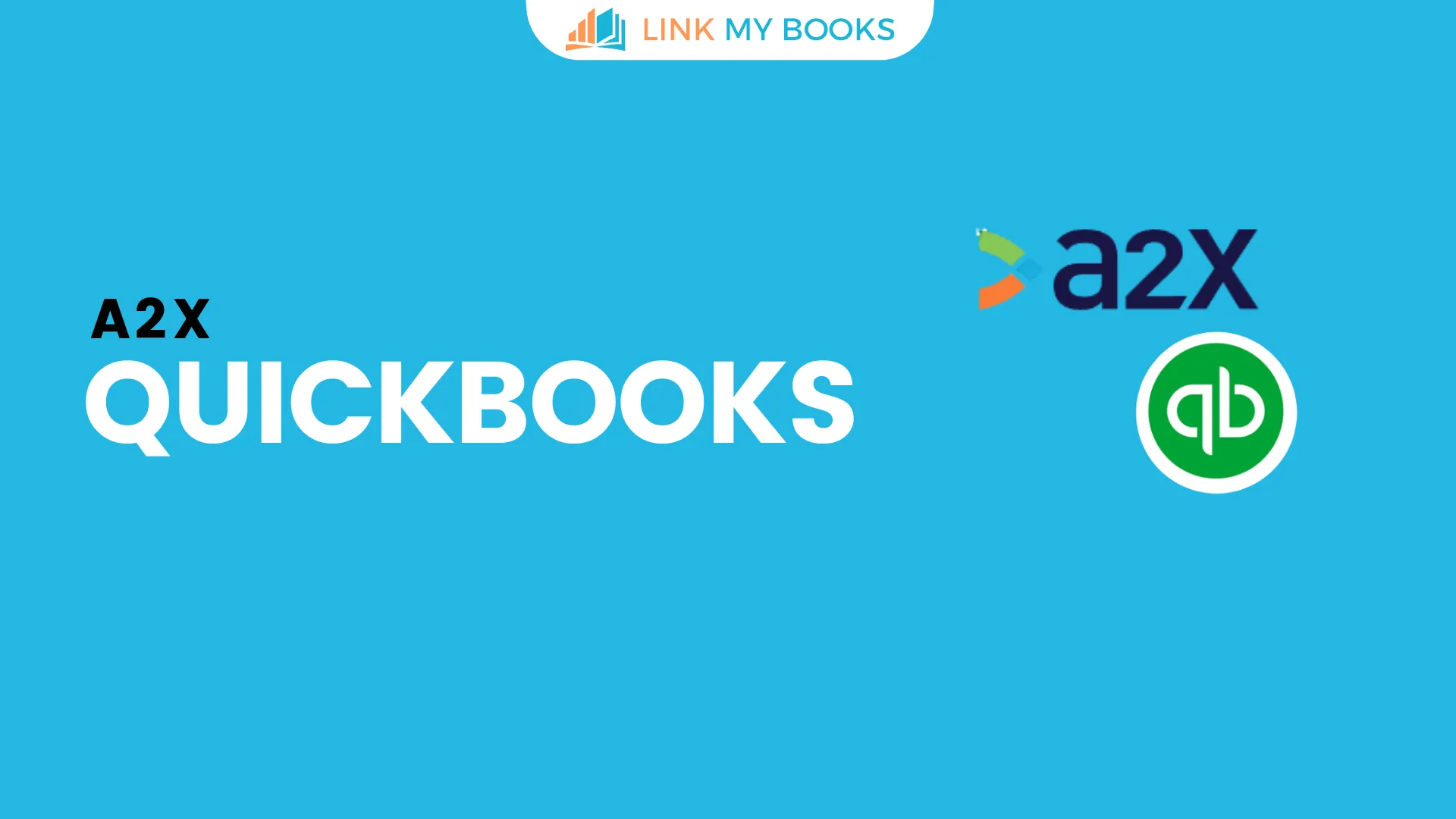










.webp)




.png)